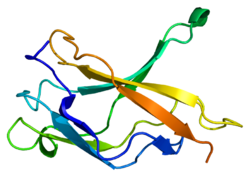Nuclear factor NF-kappa-B p105 subunit is a protein that in humans is encoded by the NFKB1 gene.[5]
This gene encodes a 105 kD protein which can undergo cotranslational processing by the 26S proteasome to produce a 50 kD protein. The 105 kD protein is a Rel protein-specific transcription inhibitor and the 50 kD protein is a DNA binding subunit of the NF-kappaB (NF-κB) protein complex. NF-κB is a transcription factor that is activated by various intra- and extra-cellular stimuli such as cytokines, oxidant-free radicals, ultraviolet irradiation, and bacterial or viral products. Activated NF-κB translocates into the nucleus and stimulates the expression of genes involved in a wide variety of biological functions; over 200 known genes are targets of NF-κB in various cell types, under specific conditions. Inappropriate activation of NF-κB has been associated with a number of inflammatory diseases while persistent inhibition of NF-κB leads to inappropriate immune cell development or delayed cell growth.[6]
- ^ a b c GRCh38: Ensembl release 89: ENSG00000109320 – Ensembl, May 2017
- ^ a b c GRCm38: Ensembl release 89: ENSMUSG00000028163 – Ensembl, May 2017
- ^ "Human PubMed Reference:". National Center for Biotechnology Information, U.S. National Library of Medicine.
- ^ "Mouse PubMed Reference:". National Center for Biotechnology Information, U.S. National Library of Medicine.
- ^ Meyer R, Hatada EN, Hohmann HP, Haiker M, Bartsch C, Röthlisberger U, Lahm HW, Schlaeger EJ, van Loon AP, Scheidereit C (March 1991). "Cloning of the DNA-binding subunit of human nuclear factor kappa B: the level of its mRNA is strongly regulated by phorbol ester or tumor necrosis factor alpha". Proc Natl Acad Sci U S A. 88 (3): 966–70. Bibcode:1991PNAS...88..966M. doi:10.1073/pnas.88.3.966. PMC 50935. PMID 1992489.
- ^ "Entrez Gene: NF-κB nuclear factor of kappa light polypeptide gene enhancer in B-cells 1 (p105)".





